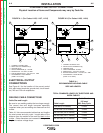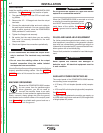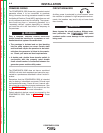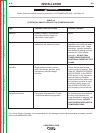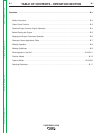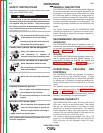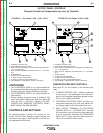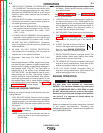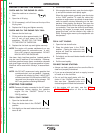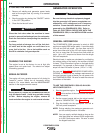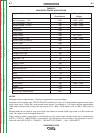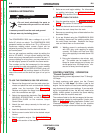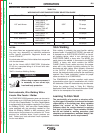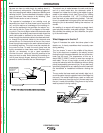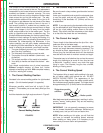
OPERATION
B-4 B-4
POWERARC® 5500
4. WELD OUTPUT TERMINAL (TO WORK) WITH 1/2
- 13 FLANGE NUT: Provides the connection point
for either the electrode holder or the work cable.
(Because the POWERARC® 5500 is an AC output
machine, either output terminal can be used for
either cable.)
5. GROUND STUD: Provides a connection point for
connecting the machine case to earth ground for
the safest grounding procedure.
6. • 20 AMP CIRCUIT BREAKERS (2): Provide sepa-
rate overload current protection for the 120 volt
and 240 volt receptacles. (For codes 11182,
11187, 11215)
• 20 AMP CIRCUIT BREAKER: Provide separate
overload current protection for the 120 volt and
240 volt receptacles. (For codes 11403, 11404)
7. 20 AMP, 240 VOLT RECEPTACLE: Connection
point for supplying 240 volt power to operate one
electrical device.
8. 20 AMP, 120 VOLT DUPLEX RECEPTACLE:
Connection point for supplying 120 volt power to
operate one or two electrical devices.
9.
Tachometer / Hour meter: (For Code 11215, 11404
Only)
Records engine speed in RPMs, engine running time,
and alerts the user to perform a specific engine main-
tenance task by flashing corresponding messages. If
the message reads “Chg Oil”, the user needs to
change the oil in the engine. If the message reads
“SVC AIR-FILTER”, the user needs to clean or if nec-
essary,change the air filter. (See Honda Engine”s
owners manual for more information). After mainte-
nance task is preformed, the user is required to use
the supplied Reset Tool to cancel flashing message
and resume normal meter operation. (See MAINTE-
NANCE SECTION for further details).
GASOLINE ENGINE CONTROLS
Refer to your engine manual for the location of the fol-
lowing features:
1. FUEL SHUTOFF VALVE: Stops the flow of gaso-
line from the fuel tank to the carburetor. Should be
closed whenever you are finished using the POW-
ERARC® 5500. Must be opened before you start
the engine.
2. FUEL TANK AND CAP: See
TTEECCHHNNIICCAALL SSPPEECCII--
FFIICCAATTIIOONNSS
for capacity.
NOTE: If you use any other alternate fuel tank or
supply, be sure to use a recommended in-
line fuel filter.
3. MUFFLER: Reduces engine noise output. Both
the Robin / Subaru and the Honda muffler serves
as a spark arrester.
See SPARK ARRESTER in the INSTALLATION
section of this manual.
4. “ON/OFF Switch: A two position switch located on
the rear of the engine. In the “ON”(I) position, the
engine ignition circuit is energized and the engine
can be started by pulling the recoil rope starter. In
the “OFF”(O) position, the electronic ignition is
grounded and the engine shuts down.
5. AIR CLEANER: Filters intake air to the carburetor.
See ENGINE MAINTENANCE in the MAINTE-
NANCE section of the engine owner’s manual for
details about the specific type of air cleaner to
use.
6. CHOKE: Provides a richer air/fuel mix-
ture for cold engine starting conditions.
See the topic ENGINE OPERATION,
below, for details on setting the choke.
7. RECOIL STARTER: Manual, rope-type starter. The
handle position allows easy starting from either
ground level or pickup-truck level
8. OIL DRAIN PLUG: Permits convenient draining of
engine oil during maintenance. Both sides of the
engine are equipped with an oil drain plug.
9. OIL FILL PLUG: Permits convenient filling of
engine oil during maintenance. Both sides of the
engine are equipped with an oil fill plug.
ENGINE OPERATION
DO NOT RUN THE ENGINE AT EXCESSIVE
SPEEDS. The maximum allowable high idle speed
for the POWERARC® 5500 is 3750 RPM, no load.
Do NOT adjust the governor screw on the engine.
Severe personal injury and damage to the machine
can result if it is operated at speeds above the
maximum rated speed.
-------------------------------------------------------------
Read and understand all safety instructions included
in the engine manufacturer’s ”Operating and
Maintenance Instructions” manual that is shipped with
the POWERARC® 5500.
WARNING
Return to Section TOC Return to Section TOC Return to Section TOC Return to Section TOC
Return to Master TOC Return to Master TOC Return to Master TOC Return to Master TOC



